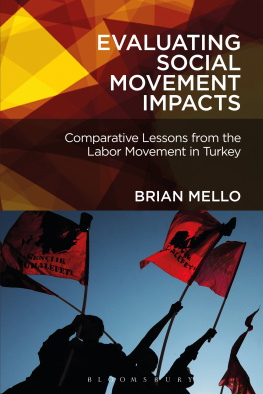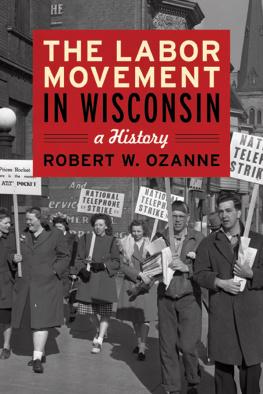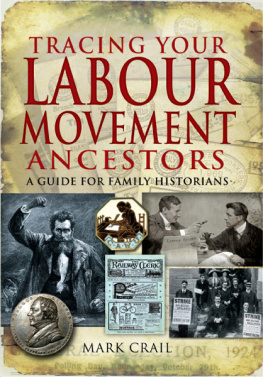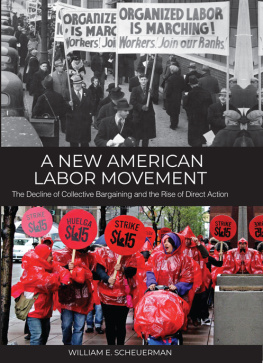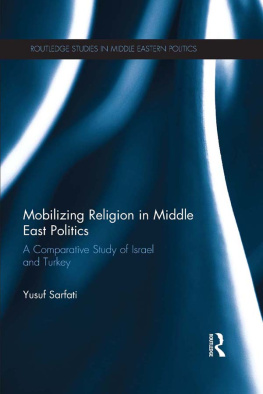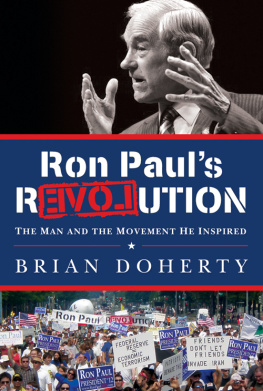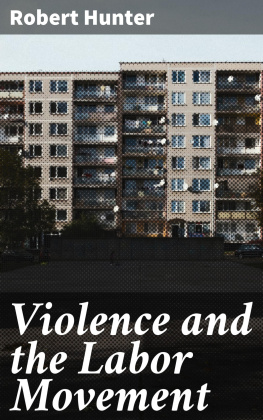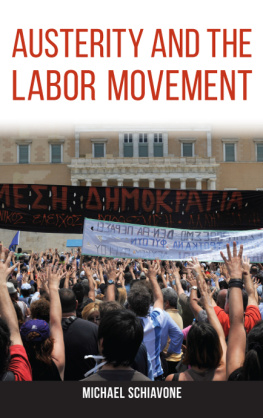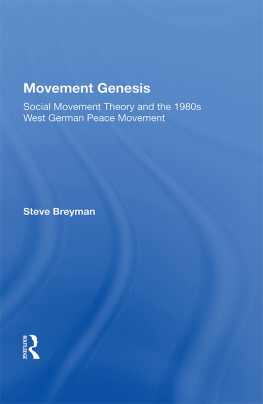By appearance in the text:
Abbreviations British Case:
| TUC | Trade Unions Congress |
| LTC | London Trades Council |
| GTC | Glasgow Trades Council |
| WMA | London Working Mens Association |
| SDF | Social Democratic Federation |
| ILP | Independent Labor Party |
| ASE | Amalgamated Society of Engineers |
| LRC | Labor Representation Committee |
Abbreviations American Case:
| AFL | American Federation of Labor |
| ALU | The American Labor Union |
| IWW | International Workers of the World |
| CIO | Congress of Industrial Organizations |
Abbreviations Turkish Case:
| CHP | Republican Peoples Party ( Cumhuriyet Halk Partisi ) |
| DP | Democrat Party ( Demokrat Partisi ) |
| EU | European Union |
| Trk- | Confederation of Turkish Labor Unions |
| TP | Turkish Workers Party ( Trk i Partisi) |
| DSK | Confederation of Revolutionary Labor Unions ( Devrimci i Sendikas Konfederasyonu ) |
| AP | Justice Party ( Adalet Partisi ) |
| MHP | Nationalist Action Party ( Milliyeti Hareket Partisi ) |
| Hak- | Confederation of Righteous Trade Unions |
| MSK | Nationalist Confederation of Labor Unions ( Milliyeti i Sendikas Konfederasyonu ) |
| KESK | Confederation of Public Laborers Unions ( Kamu Emekileri Sendikalar Konfederasyonu ) |
| AKP | Justice and Development Party ( Adalet ve Kalknma Partisi ) |
| DDKO | Revolutionary Eastern Cultural Hearths |
| PKK | Kurdistan Workers Party |
| HEP | Peoples Labor Party ( Halkn Emek Partisi ) |
| DEP | Democracy Party |
| HADEP | Peoples Democracy Party |
| DEHAP | Democratic Peoples Party |
| RP | Welfare Party ( Refah Partisi ) |
| MSAD | The Association of Independent Industrialists and Businessmen |
Completion of this book would not have been possible were it not for the inspiration, support, feedback, and assistance of many people and organizations.
Academically, this book, and the doctoral dissertation upon which it builds, represents the culmination of a journey that has benefited from and been inspired by a number of true teachers. The foundation of this work emerged from my undergraduate experience at Fairfield University, where Marcie Patton and Kathi Weeks helped inspire my interest in Turkish politics and questions of subjectivity and political theory. At the University of Washington, I was able to continue this development through the guidance and supervision of a dissertation committee that was both supportive of my project and willing to give me the freedom to define my own path. Michael McCann was supportive of my wish to design an exam field in social movement studies, and was instrumental in helping me strive to clarify my argument and analysis. Nancy Hartsock was influential in my efforts to bring political theory into comparative politics research. My understanding of Turkish politics would be woefully inadequate if not for Reat Kasaba. Finally, I could not have imagined a better dissertation supervisor than Stephen Hanson. My understanding of comparative politics owes much to Steves ability to capture the subfield. I would like to thank Selim Kuru for teaching me Turkish, helping translate my interview questions, supporting my interest in Turkish leftist politics, and connecting me with his family while I was in Ankara in 2004.
In addition, I would like to acknowledge the tremendous importance that the Turkish Studies Group at the University of Washington had on this project and my growth as a scholar. This organization of faculty and students who study all aspects of Ottoman and modern Turkish society, politics, and culture read, critiqued, and offered feedback on this project since its inception.
I would also like to thank Nicole Watts for offering me support and access to some of her own research materials during the very early stages of this project. Nicole also invited me to serve as a guest editor for a special issue of the European Journal of Turkish Studies based on the labor movement in Turkey. The article that I contributed to this project, and the helpful feedback of several anonymous reviewers transformed the way that I conceptualized the theoretical framework developed in this project.
I owe a special debt of gratitude to my colleagues and to two Provosts, who, over my five years at Muhlenberg College, have supported my research agenda. A grant from Muhlenberg allowed me to work with an excellent student, Katherine Pearson, on the research that informs my reading of the Japanese case, and a summer grant from the Provosts Office allowed me to update the Turkish material with new publications that had been brought to my attention during the process of finalizing the European Journal of Turkish Studies issue. In addition, my early research on the labor movement in Turkey would not have been possible without financial assistance from the University of Washington Graduate Schools Chester Fritz Fellowship; a research grant from the Harry Bridges Center for Labor Studies; and a dissertation writing grant from the Institute of Turkish Studies. In addition to this financial assistance, support for my fieldwork in Turkey was provided by the helpful guidance of Gavin Brockett, and by a number of Turkish labor activists who set up and transported me to group interviews, took me on walking tours, and shared their experiences, thoughts, and tea with me.
Finally, I owe the greatest debt to my hero and spouse, Jennifer Smith. She has been my strongest supporter and best friend.
I often begin discussing the labor movement in Turkey by recalling my experiences at a May Day rally in Ankara that I attended in 2004.1 The rally itself was a mix of carnival and politics. Groups of young people danced beneath banners, while labor leaders spoke about the need for greater government concern for the working class, about the need to resist the privatization of stateowned industries, and about the need to end the US military occupation of Iraq. While I have never been so nave as to think these particular public displays of the Turkish labor movements political concerns led to any political changes, I was struck by just how much more political this celebration of labors contribution to society seemed than Labor Day in the United States, which, while replete with picnics and department store sales, lacks these annual mass demonstrations of political concern.
The differences between the labor movement in the United States and in Turkey, which this event evoked, are an indication, I argue, of the enduring legacy of the Turkish labor movement activism of the 1960s and 1970s. To those familiar with the massive state repression that the Turkish labor activists faced after the 1980 military coup, this may seem counterintuitive. Indeed, the contrast between the thousands of workers gathered in the heart of the nations capital on May Day and academic declarations of the Turkish labor movements relative lack of historical importance lies at the heart of this project. This book seeks to advance our understanding of how social movements matter by drawing comparative lessons from the labor movement in Turkey.

